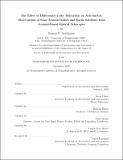The effect of differential color refraction on astrometric observations of Solar System bodies and Earth satellites from ground-based optical telescopes
Author(s)
Geykhman, Roman O.
Download1143739427-MIT.pdf (35.51Mb)
Other Contributors
Massachusetts Institute of Technology. Department of Aeronautics and Astronautics.
Advisor
Kerri Cahoy.
Terms of use
Metadata
Show full item recordAbstract
Earth's atmosphere is optically dispersive and subjects astrometric observations from ground-based optical telescopes to systematic bias from differential color refraction (DCR). This bias is evident in Minor Planet Center observations of asteroids with known spectral types and in observations of GPS and GLONASS satellites. DCR bias is on the order of 0.1 arcsec, and until recently, őxed-pattern star catalog errors exceeded this level. With the release of the Gaia DR2 star catalog in April of 2018, catalog error is no longer dominant and the systematic error ŕoor in ground-based astrometry is deőned by DCR. Unaccounted-for DCR bias in observations can introduce a small but statistically signiőcant bias into the estimate of Keplerian mean motion of inner Solar System asteroids, reduce the probability of successfully observing a stellar occultation by a Kuiper Belt Object, and in rare pathological cases can mean the difference between predicting an impact or a miss by a hazardous asteroid. DCR in observations of geostationary satellites can introduce a large bias into the estimate of solar radiation pressure area-to-mass ratio in a single-night orbit őt and tens of meters of error into an orbit prediction derived from several nights of observation. Measurements of the 2017 near-Earth ŕyby of the asteroid 3122 Florence from MIT and MIT Lincoln Laboratory facilities in Westford, MA and Socorro, NM suggest that narrow passbands are insufficient to mitigate DCR, and measurements of a sample of geostationary satellites' spectra at the US Naval Observatory Flagstaff Station show that the DCR bias of active satellites can vary by up to 0.1 arcsec over half an hour. While the DCR of őducial stars is predictable from catalog data, satellites' DCR must be measured directly. To that end, a slitless spectrograph was deployed at the Firepond Optical Facility in Westford, MA and observed GPS and GLONASS satellites over seven nights. Using that data, I demonstrate DCR compensation yielding a 60% reduction in bias and 30% reduction in noise in astrometric residuals relative to color-agnostic processing when all atmosphere-induced effects (stellar DCR, target DCR, and parallactic refraction) are accounted for.
Description
This electronic version was submitted by the student author. The certified thesis is available in the Institute Archives and Special Collections. Thesis: Ph. D., Massachusetts Institute of Technology, Department of Aeronautics and Astronautics, 2019 Cataloged from student-submitted PDF version of thesis. Includes bibliographical references (pages 289-300).
Date issued
2019Department
Massachusetts Institute of Technology. Department of Aeronautics and AstronauticsPublisher
Massachusetts Institute of Technology
Keywords
Aeronautics and Astronautics.